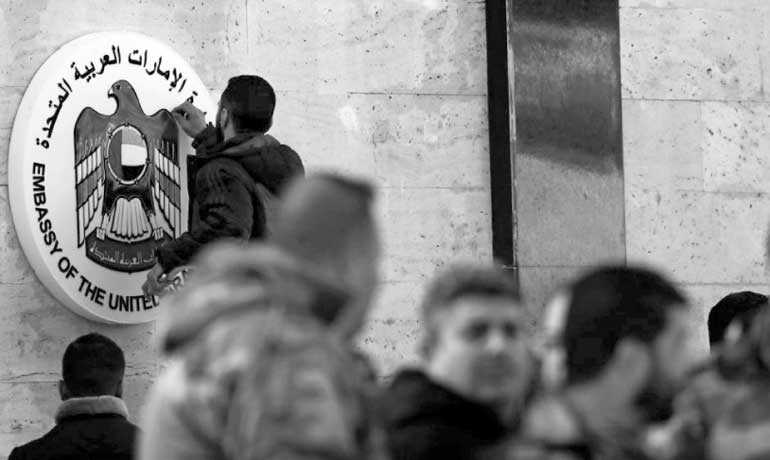Tuesday Feb 17, 2026
Tuesday Feb 17, 2026
Saturday, 29 December 2018 00:10 - - {{hitsCtrl.values.hits}}

A man works on the emblem of the United Arab Emirates embassy in Damascus during its reopening, Syria - Reuters
Damascus/Dubai (Reuters): The United Arab Emirates reopened its embassy in Damascus on Thursday, marking a diplomatic boost for President Bashar al-Assad from a US-allied Arab state that once backed rebels fighting him.
The UAE said the move aimed to normalise ties and to curb risks of regional interference in “Arab, Syrian affairs” – an apparent reference to non-Arab Iran, whose support for Assad has been critical to his war effort.
“The UAE decision ... came after a conviction that the next stage requires the Arab presence and communication in the Syrian file,” tweeted Anwar Gargash, the UAE Minister of State for Foreign Affairs.
The reopening of the embassy is a step towards Syria’s rehabilitation by its Arab peers. Its membership in the Arab League was suspended seven years ago. Gargash told Al Arabiya TV that its readmission would require Arab consensus.
The UAE flag was raised at the embassy, shut since the early months of Syria’s conflict nearly eight years ago. The UAE Foreign Ministry said its charge d’affaires assumed his duties on Thursday.
Robert Ford, who was serving as the US ambassador to Syria when the uprising against Assad erupted in 2011, said the UAE embassy re-opening indicated that the Sunni Muslim Gulf monarchy seeks to re-exert influence in Syria to blunt that of its Shiite-led foe, Iran.
“I think they are hoping that over time that by financial and diplomatic re-engagement with Damascus, they can reduce Iranian influence,” said Ford, now a fellow with the Middle East Institute think tank who also teaches at Yale University.
Ford noted that the UAE has a “vibrant private sector” that is far better resourced than Iran to participate in the massive reconstruction effort that Syria requires.
The UAE was one of several regional states to back armed groups opposed to Assad, though its role was less prominent than those of Saudi Arabia, Qatar or Turkey, rebel sources in the region have said. Emirati support has been associated with groups opposed to Islamist domination of the uprising.
Nearly eight years into the war, Assad has recovered control of most of Syria with support from Russia, Iran, and Iranian-backed Shi’ite Muslim groups such as Lebanon’s Hezbollah.
His military advances gathered pace this year with the defeat of the last big rebel enclaves near Damascus and recovery of the southwestern region.
Earlier this month, Sudanese President Omar al-Bashir became the first Arab head of state to visit Damascus since the start of the Syrian conflict, flying into Damascus airport.
The border crossing between Syria and Jordan, another US ally that backed the rebels, was reopened in October. A Syrian passenger flight flew to Tunisia on Thursday for the first time in nearly eight years.
An Arab diplomat, speaking on condition of anonymity, told Reuters last week he believed most Arab states wanted Syria to be readmitted to the Arab League, with only three or four states expected to oppose it.
Arms, training and funds from Arab states were funnelled to Syrian rebels through a program overseen by the CIA until US President Donald Trump ordered it shut down last year.
In another potential lift for Assad, Trump also last week decided to withdraw US forces deployed in northern and eastern Syria in support of Kurdish-led militia.
The US State Department has not commented on the UAE’s move.
But Ford believes that Washington “probably just acquiesced” as the Trump administration is “more and more just washing its hands of Syria.”
The anti-Assad insurgents’ last foothold is an arc of northwestern territory abutting Turkey, which still supports them.
Assad has vowed to recapture control of the entire country.